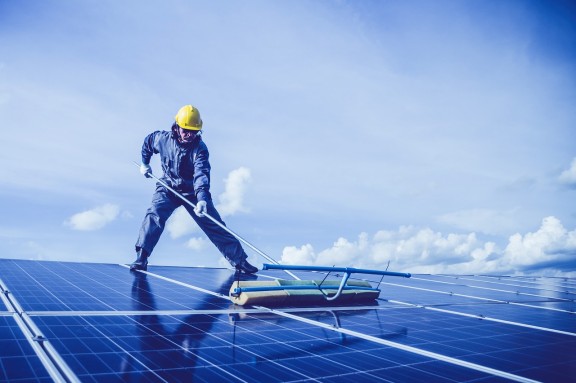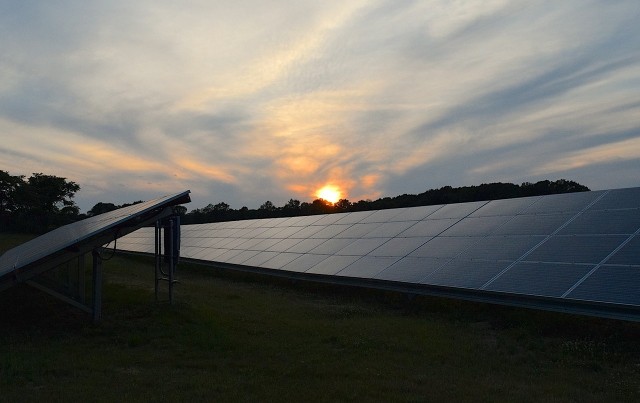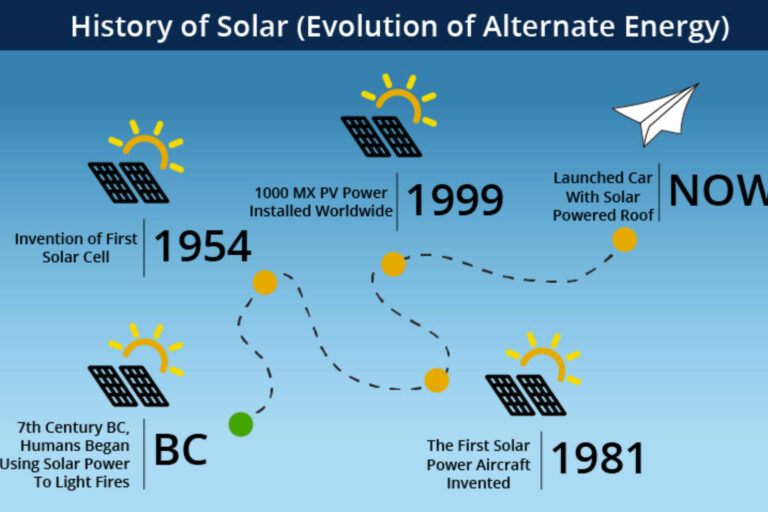How To clean Solar Panels (What, why & How)
Solar panels are devices that absorb the sunlight incident on their surface and convert it into electricity. When dust and dirt are built on the surface, it reduces the electricity generation efficacy. Therefore, it is advised to clean solar panel surfaces twice a year.
In this blog, we discuss the common contaminants of solar panel surfaces, ways to clean panels, the precautionary measures, and the benefits of regular cleaning of panels.
Why do you need to clean solar panels?
It is common for solar panels to get dirty. Maintaining clean solar panels not only retains their energy conversion efficiency but also is important from the point of view of safety. Depending on the amount of dirt accumulated on the panels, the energy production may be reduced by 5-10%. This may not significantly affect the electricity bill for small residential systems. However, a 5-10% reduction in energy can severely affect commercial and utility-scale solar farms. In such situations, routine cleaning of PV or hiring professional panel cleaners is to be considered on a serious note.
There are several ways in which the panels may get dirty. Here is a list of the most common causes:
Dust Accumulation: Over the period after installation, the dust can accumulate. Layers of dust buildup, thus need to be prevented by regular cleaning.
Corrosion: In case water gets inside the panel, it may lead to corrosion. It results in reduced energy conversion by the panels.
Debris: The debris coming from plants or animals may stick in between the cells. This might block the pathway and not give free flow to the current flowing through the solar panels.
Seepage of rainwater: When the rainwater seeps into the panel, it may destroy the panels. The moisture inside the cells causes rusting around the metal connections due to corrosion.
Air pollution: With the rise in urbanization, the air quality index is highly affected all across the globe. People living in a zone of high pollution need to pay special attention to the maintenance of solar panels.
Heard of These Cool Solar Panel Cleaning Systems?
Check out this article:
Solar Panel Cleaning System Explained
When do you need to clean solar panels?
Since solar PV systems usually require minimal maintenance, they usually have to be cleaned once or twice a year. However, in some areas, the cleaning might have to be done more frequently. These include-
Areas of high pollution:
Areas that are more prone to air pollution– areas near factories, industrial areas, and airports might end up having higher build-up on the panels, necessitating more frequent cleaning.
Areas with lots of trees:
Areas near forests or fields, with a lot of trees will have things like leaves, dust, etc., accumulating on the panels. Moreover, these areas also house animals like birds and insects which can end up dirtying the surfaces of the panels more often.
Deserts:
Places in the desert like the Middle Eastern countries and the Southwest in the USA are very prone to dry and dusty winds and sandstorms which could majorly obstruct the efficient working of the panels.
You might wonder, How do I know when it’s time to clean my solar panels? The best way to tell is when the efficiency begins to fall. Moreover, the best season to undertake this activity is spring, preferably in the early morning or late evenings when the panels are preferably cooler.
How to clean solar panels?
One can rely on rainwater to clean the solar panels naturally if not living in dust-prone areas. Rainwater shall typically remove about 95% of any dust, pollen, dirt, or debris built up on the surface, this minimizes the effort to clean the panels. But drizzle may not wash away the debris completely. Also, if there is significant buildup, especially in areas with heavy smog, reliance on rainwater may not be sufficient to clean the panels well.
As we know, cleaning solar panels is a back-breaking task, and eco-enthusiasts have come up with tricks to ease this task. Here are some of the easy ways to do it:
- Use of Robots: Robots can be programmed to clean solar panels. A robot can get inside a panel and clean it. It can efficiently remove dirt and debris which would otherwise be left behind by hand. Using a robot is the most effective and time-saving method along with less risk of scratching the solar panel while cleaning it. Check out this video to see how a Robot cleans the solar panel!https://www.youtube.com/watch?v=bHSScaaqcLk&ab_channel=NevonProjects
- Soap-Less Brushes and Sponges: These brushes and sponges are most appropriate for cleaning the surface of panels. Manufactured using natural components– including wood, rubber, and plastic, the bristles are made up of eco-friendly material, including bamboo. These are soft bristles that can be used to clean even the most delicate surfaces like the panels without any worries.
- Waterless Vibration process: This process of cleaning involves the cleaning of a solar panel’s surface with the help of a tool called an industrial vibrator or “Vibra-clean”. High frequencies are used to break down dirt and grease on the surface of the panel. Moreover, the process is completely safe and does not harm the surface of the panel or its internal components. The cleaning process uses no water or any other damaging solvents and is relatively straightforward– requiring no special equipment or tools either.
- Nanoparticle Coatings: The nanoparticle coatings are specifically designed to clean the panels. It is a type of coating applied by the use of an electrostatic spray gun or a roller that can be used on metal surfaces and glass. It works to remove the dirt and grime from both surfaces of the PV panel
- Manual panel cleaning: Of all methods, it is rated as the most popular among homeowners when it comes to cleaning the panels. Just a garden hose, sponges, water, and some heavy elbow grease and you are good to go. To clean the panels from the field manually, do as follows:
- First, take off the caps on the solar panels by unscrewing the caps.
- Next, put on the rubber gloves and start to scrub using a sponge. Note that the sponge should not have holes or irregularities on the surface in excess, as when these are filled with water, the water is likely to be squeezed into the panel, and could damage it over time.
- After scrubbing the dust from the panels, rinse with water until fully dry. Be careful to ensure that no water is trapped between two panels, which can leech out in the long run to rust and corrode the panels. This would affect the performance of the panels. Check out the video below for some amazing solar panel cleaning hacks!
https://www.youtube.com/watch?v=yLspwfXw3pQ&ab_channel=Lumencity
Precautions
Contacting the manufacturer for advice on how to clean your panel is strongly advisable before doing so. Poor cleaning of the panels can reduce efficiency or even invalidate your system’s warranty. Further, bad quality water or inappropriate cleaning agents also pose the risk of damaging the modules and array components. The right measures to avoid any kind of damage should be followed. After that, the following points are to be checked to ensure safety:
Safety of Personnel: When the panels are connected in series they are capable of producing electricity as high as 800W. Cracks in the module or any broken cable or joints in a string can prove to be quite dangerous for the cleaner especially when the modules are wet. The voltage and current produced by the array may be lethal even when it is exposed to less sunlight. Therefore, before cleaning the panels, the modules should be checked for any cracks, damages, or loose connections. The cleaning personnel should also use the right kind of electrically insulating PPE while cleaning. Lastly, make sure to switch off the panels before cleaning
Consult the manufacturer about how to turn off the system and how to turn it back on after cleaning. Also, be careful not to touch the bottom side of the panel. In case a high quantity of debris or dirt accumulates, seek the help of solar panel repair tech for instructions.
Best time to clean: It is recommended that the panels should be cleaned during low-light conditions when the electricity generated is lowest. Since the sun shines bright during the day, the panels get heated up as well. In case the panels get cleaned with cold water during this period, then there will be a chance of thermal shock to the panel which may result in permanent damage.
Cleaning Agent: Avoid cleaners that contain abrasives such as acids or alkali detergents. Do not scrape any baked material off the panel with a metal object or an abrasive product because it can scratch and cast shadows on the same. Use a mild, non-abrasive, and non-caustic detergent blended in Deionized water for cleaning.
Removing stubborn marks: The marks of bird dropping, dead insects, tar, and other stubborn dirt should be removed with a soft sponge or microfiber cloth. Then clean the module immediately with a liberal quantity of water.
The pressure of water: While cleaning using a high-pressure hose, may rupture the module. The water pressure at the nozzle should not be more than 35 bar.
Water quality: The cleaning of the modules shall be done using Deionized water. If not available, rainwater or tap water may also be used. The mineral content in the tap water shall be low and at maximum, a total hardness of less than 75ppm in the tap water can be used
Water Temperature: The solar modules should be cleaned when the modules are at a cool temperature. To avoid any mishap, it is recommended to use the water at temperatures the same as the ambient temperature.
Advantages of cleaning solar panels
Cleaning of solar panels is an assurance for a long life. Panels should be cleaned as often as possible to avoid any form of degradation. Some of the benefits that arise from cleaning panels are as follows:
Efficiency: The energy from the panel results out of a conversion process, which implies that the light that falls on the panels is converted into direct current. If the surface has a cover of dirt on top, then there will be a lesser amount of absorption of light within that area, which in turn will lower the efficiency of the conversion process. Cleaning regularly helps to enhance the efficiency of the generation process by getting rid of any buildup of dust or dirt.
Warranty: Solar panels are usually under at least a 25-year warranty. It proves to be short if all of a sudden, due to some malfunction, one of the panels begins to misbehave during this period. Quality cleaning practice thus proves to be the guarantee of not only perfect functioning through the warranty time but also continued working even after the warranty period.
Enhanced Durability: Cleaning frequently will keep the panels free from the degradation caused by a build of dust and debris, thus ensuring a long life and performance.
ROI: Cleaning and regular maintenance, improves the ROI time. ROI time is the return-on-investment time, and the cleaning of the panels reduces the time it takes to see results, as it maintains the energy conversion efficiency.
Conclusion
The panels have to be cleaned twice a year to uphold efficiency in converting energy. The various ways used to clean the panels include a robot, soap-less brushes and sponges, nanoparticle coating, and most frequently, manual cleaning. However, it always is wise to look for information from the manufacturer regarding the right method of cleaning for your solar PV system, before the commencement of cleaning work. Also, the panels should be inspected for any cracks or damages. Some other precautions that need to be kept in mind are the quality of the water, the kind of sponge fit for the cleaning, temperature, and pressure of the water, etc., Following these steps can help you maintain the efficiency and durability of your solar panels!
Conclusion
The long trajectory of developments and the ever-increasing technological innovations make the path of Solar Power an expectant one. With Worldwide usage estimated to increase manifold in the next 20-30 years, considerations about long-term investments and the hazards that Solar generation brings in its wake are essential to keep this sustainable energy source up and running solar applications across the world.
Frequently Asked Questions (FAQs)
The proper way to clean the solar panels should first be checked in with the manufacturer. Use appropriate detergents that are safe, non-toxic and non-corrosive. Panels can be cleaned either manually or, by hiring a professional service.






